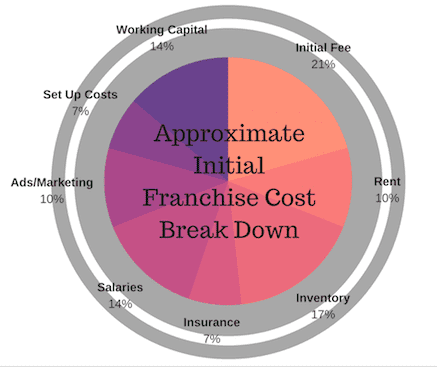Written by Cindy Rayfield
When I meet with clients who are looking to buy a business, I am usually asked, “Why is the initial franchise investment so high?” Relatively speaking, the investment for franchises, whether in Colorado where we are based or in other parts of the country, isn’t as high as people think, especially when put into context and compared with other start up businesses.
My work with franchise clients requires me to provide some education so they really understand what goes into the franchise initial investment. Here’s the information people need to know about franchise investment costs.
What does an initial franchise investment mean?
The initial investment for franchises, listed in the franchisor’s Franchise Disclosure Documents (FDD), includes everything it takes to get a franchise open and operating for the first several months. Examples of franchise costs include the franchise license fee, in addition to training, build out, signage, marketing and advertising, monthly rent, employee salaries, inventory, computer systems, vehicles, equipment, office supplies, etc. Anything that’s going to keep your new business running in the beginning.
A new franchisee may be able to get the doors open for a smaller sum of money, but the franchisor wants their new franchisees to be operating until they can stand on their own with the business revenue. This means capital is needed to make it through for a while. No business owner wants to be operational for only the first three months, when 6 months down the road the business could be covering its monthly costs.
What does the new franchisee pay to the franchisor?
The franchisor receives the initial franchise license fee from the new franchisee when they make their initial commitment to invest. After that, the costs to other vendors and providers comes out of the franchisee’s own pocket, so financing needs to be ready up front. The following example expenses are paid directly out of the franchisee’s pocket, with the franchisor’s support and guidance along the way:
- The contractor needs to be paid for build out.
- The sign manufacturer needs to be paid for the new sign.
- The landlord needs the deposit and a sum of rent.
- The insurance company needs to be paid for liability and any other insurance.
- Computers need to be purchased.
- Advertising needs to be coordinated and paid.
Franchisors have these expense details listed in their FDD, and the total amount a franchise is going to cost from their experience opening other locations. Costs will be broken down, line item by line item, with a range from the very low end to the very high end. Expenses include everyday items a business needs that no one ever thinks about – especially those who are new business owners or want to buy a franchise in Colorado or elsewhere.
My franchise clients do their research when looking for a business to buy, and part of that is understanding what the costs really are. Only in franchising can a potential investor know the true costs of their investment, from top to bottom.
Factors that determine Franchise Initial Investment
Franchise License fee – about $25,000 to $50,000, paid directly to the franchisor for the franchise territory. This may vary depending on how many licenses are purchased and the size of the territory.
Type of business – Retail with foot traffic requires higher cost in marketing to get people to come to you. Business to business concepts have a smaller market to target so marketing costs can be contained and controlled. Specialty businesses such as home improvement, pet care, kids education have niche markets, which can keep rent and marketing costs lower.
Time and Effort – If you invest in an owner-operator model, you can control your own salary or defer it to put more money back into the business, keeping your costs under control. In many cases, you may be able to do the work yourself, minimizing the need for employees. If you choose a semi-absentee model, your presence is automatically minimized so you’ll have to pay someone to be you, plus you’ll need more employees to service your customers.
Location – Brick and Mortar costs are higher for build out, and monthly rent can be thousands of dollars per month. Franchises that can be operated from a home office or an executive suite, or where customers won’t be coming to you directly, will be much less expensive that A+ retail.
Employees – If you have a business that requires employees, that drives your monthly cost higher, but some concepts require employees to grow. In concepts where you have few to no employees, you’ll be doing the work yourself, and that may not be in your vision. Hiring franchise employees can be a difficult task but it can also be extremely beneficial for business expansion.
Working Capital Requirement – Almost all franchises require a working capital amount to be available in a franchisee’s bank account. This is intended to be used for payroll, rent and advertising for several months, as well as a cushion for the unexpected.
Advertising and Marketing – Retail franchises that need a lot of foot traffic may have some pretty hefty marketing and advertising costs, which will be ongoing every month. When you buy a franchise you’ll determine whether or not it will require advertising at all, as some don’t but rather require more networking or sales calls.
Setup Costs – While buying a Denver Colorado business for sale you’ll find that there are many initial costs required during the setup process. These costs could include anything such as build out, signage, travel costs for training, computers, software, furniture, copiers, printers, vehicles, equipment, inventory, business cards and more. It’s always beneficial to consult with a Franchise Broker to ensure that you have all that you need and set you up for success.





